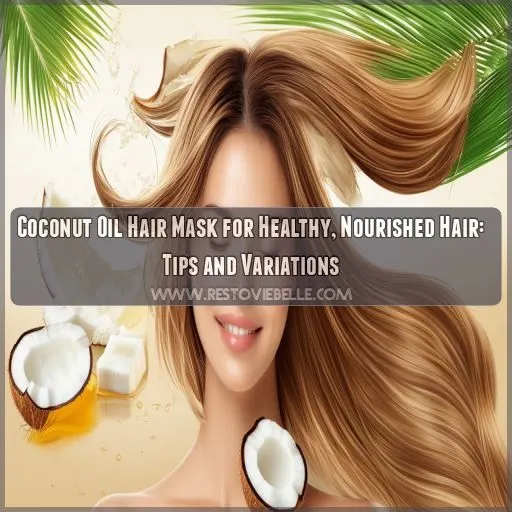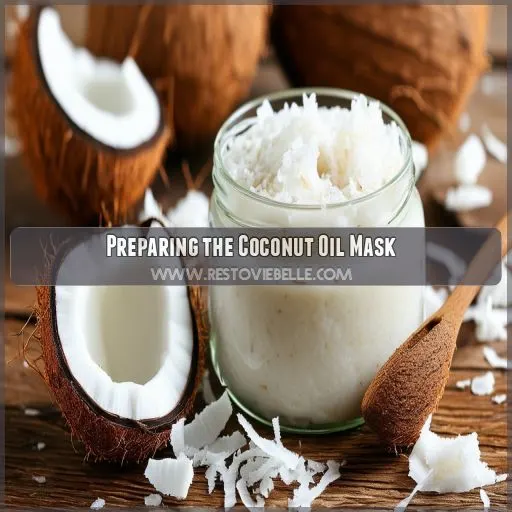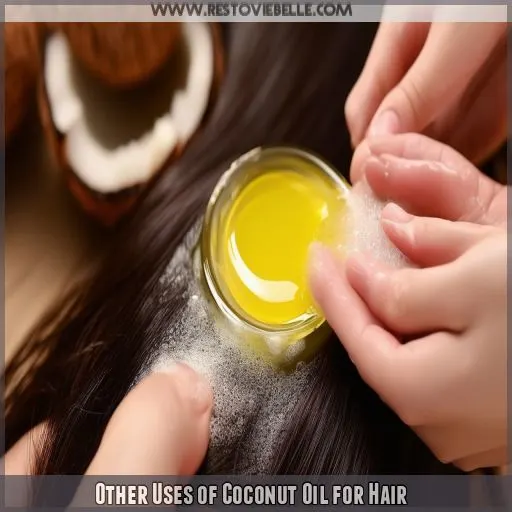This site is supported by our readers. We may earn a commission, at no cost to you, if you purchase through links.
 Learn how a coconut oil hair mask provides healthy, nourished hair.
Learn how a coconut oil hair mask provides healthy, nourished hair.
Here’s an easy guide with step-by-step directions, tips, and even some variations to tailor this mask to just your type of hair.
This is where the special properties of coconut oil can, in its very own way, hydrate, strengthen, and protect your hair from the many man-induced issues; this can be an absolute boon, including natural solutions for problems related to dryness and breakage.
Go through other recipes with combinations that include honey and eggs for more special benefits.
Turn to a pro with this simple, follower-friendly approach to haircare
Table Of Contents
- Key Takeaways
- How to Do Coconut Oil Hair Mask?
- Choosing the Right Hair Type
- Preparing the Coconut Oil Mask
- Leaving the Mask On
- Rinsing and Shampooing
- Variations and Additional Ingredients
- Other Uses of Coconut Oil for Hair
- Tips for Best Results
- Frequently Asked Questions (FAQs)
- Is it better to put coconut oil mask on wet or dry hair?
- How to coconut oil mask hair?
- How long do you leave coconut oil in your hair?
- Do you wash your hair before or after coconut oil?
- Can coconut oil mask repair split ends?
- Is coconut oil hair mask safe for color-treated hair?
- How often should I use coconut oil mask?
- Will coconut oil hair mask help with scalp acne?
- What is the shelf life of a coconut oil hair mask?
- Conclusion
Key Takeaways
- Give your hair a tropical getaway with a coconut oil mask! It’s like a vacation for your locks, leaving them refreshed, hydrated, and ready to take on the world.
- Treat your hair to some TLC with coconut oil’s moisturizing magic. It’s like a soothing balm, melting away dryness and leaving your hair feeling silky smooth.
- Customize your coconut oil mask to suit your hair’s needs. Add honey for extra hydration or an egg for a protein boost. It’s like a hair care buffet, catering to your every desire!
- Give your hair a break from harsh chemicals and embrace the natural goodness of coconut oil. It’s like a breath of fresh air for your scalp, helping it stay healthy and balanced
How to Do Coconut Oil Hair Mask?
To do a coconut oil hair mask, start by combing your hair to get rid of any tangles. Then, section your hair and apply 1-2 tablespoons of coconut oil, focusing on the ends. Use a wide-tooth comb to distribute the oil evenly.
Once applied, cover your hair with a shower cap or towel to retain moisture and heat. Leave the mask on for at least 30 minutes, or overnight for extremely dry or damaged hair.
Finally, rinse and shampoo thoroughly to avoid greasiness. For best results, add essential oils or honey.
Curious about variations and benefits? There’s more to discover!
Choosing the Right Hair Type
Knowing your hair type is essential before starting with a coconut oil hair mask. Versatile treatment works wonders on dry, frizzy, curly, and damaged hair, each of which spells out specific benefits.
Suitable Hair Types
Coconut oil hair masks work wonders for various hair types. If your hair is dry, frizzy, prone to breaking, or damaged, it’s a match made in heaven.
- Dry hair: Moisturizes and hydrates.
- Frizzy hair: Smooths and tames flyaways.
- Breaking hair: Strengthens weak strands.
- Damaged hair: Nourishes back to health.
It’s your solution for hair woes
Identifying Hair Needs
Knowing the best condition of your hair will allow you to receive the best benefits from a coconut oil hair mask. You need to see the texture of your hair, the situation of your scalp, and the problems with the hair. Do you need to improve moisture and elasticity? Maybe stimulate hair growth or treat general hair health? Use the following table to help in your assessment:
| Hair Type | Needs | Signs | Benefits |
|---|---|---|---|
| Dry | Moisture | Dull, brittle | Adds moisture, reduces breakage |
| Frizzy | Control | Unmanageable, frizzy | Smooths, adds shine |
| Prone to breaking | Strength | Weak strands, frequent breakage | Improves elasticity, strengthens |
| Curly | Description | No curl definiton | It enhances the curls, adds a bounce to it |
Knowing your hair requirements helps tailor the mask for optimal results
Customization Based On Hair
Personalize your coconut oil mask by using more or less coconut oil, depending on how dry your hair is.
For dehydrated hair, consider an overnight application for maximum hydration. Pay attention to your scalp. The addition of essential oils can help with benefits to scalp health. However, be careful not to put too much since frequency is essential.
It’s enough to get reduced hair breakage and have the best care for your hair once a week
Preparing the Coconut Oil Mask
Before applying the coconut oil hair mask, comb your hair. Then, secure it with a shower cap or towel so that the heat will be able to sink and maintain itself within it.
Comb Through the Hair to Ensure Even Distribution
If the coconut oil is used as an effective mask, it should be evenly spread out when combed through hair so each strand benefits from it. For more straightforward application, it helps to start with damp hair. These are the steps:
- Use a wide-tooth comb: It avoids breakage and gives the required gentleness for detangling.
- Section off your hair: Section off your hair so it’s easier to apply the coconut oil accordingly.
- Comb through each section: After doing the above, comb through each section again and ensure the coconut oil is distributed equally — this promotes overall health and effectiveness to the hair.
Cover Your Hair With a Shower Cap or Towel
After combing your hair to spread the ingredients equally, it’s time to wrap it up. Use a shower cap or a towel—whatever you prefer—to cover your hair and lock in the moisture along with some heat, thus maximizing the mask’s potential.
You can use whatever wrap style is preferred: using a tightly fitting shower cap or with a turban-style towel. Leave on for the optimal length of time: 1-2 hours, depending on your hair’s porosity and needs.
This step transforms your coconut mask into an intense hair treatment and gives extra oomph to your hair care routine
Leaving the Mask On
Leaving the coconut oil hair mask on is essential. You can apply it for 30 minutes or, depending on needs, even overnight.
Here is how to decide:
- Short duration: This would be from 30 to 60 minutes as a quick boost of nourishment.
- Longer duration: 1-2 hours for further moisturizing.
- Overnight: Best for extremely dry, damaged, or frizzy hair, but save the pillows from the buildup.
Rinsing and Shampooing
Rinse: After an hour of letting your coconut oil hair mask work its magic, it’s time to rinse it out. Rinse with lukewarm water to not stress the natural oils out, and a gentle shampoo to cleanse. Apply the shampoo directly onto the dry hair, and once finished, rinse. Shampoo again, if required, and condition as usual. For the best results, focus on not getting any tangles while rinsing, which is done by running fingers or a wide-toothed comb through; this way, every strand will be clean and nourished.
| Step | Action |
|---|---|
| Rinse | Thoroughly rinse the mask with lukewarm water. |
| Shampoo | Gently apply shampoo directly on dry hair and rinse. |
| Condition | Follow with your usual conditioner for extra moisture. |
Variations and Additional Ingredients
To enhance your coconut oil hair mask, consider adding honey for extra hydration or an egg for added protein strength. These variations cater to different hair needs, ensuring customized care
Coconut Oil and Honey Mask: Adds Extra Hydration
For extra hydration, a coconut oil and honey mask is a game-changer. Honey is packed with moisture, making it ideal for dry, dull hair. The combination of coconut oil and honey helps to deeply nourish, alleviate scalp irritation, and rejuvenate your locks. Here’s how to do it:
- Mix 1 tablespoon of coconut oil and 1 tablespoon of honey.
- Apply to clean, damp hair, ensuring even coverage.
- Leave on for 30 minutes to an hour, then rinse thoroughly.
You’ll notice smoother, shinier hair after just one application!
Coconut Oil and Egg Mask: Provides Protein for Strengthening
A coconut oil and egg mask offers fantastic benefits for hair nourishment and protein strengthening. Eggs pack protein that can aid in restoring damaged hair and preventing hair breakage. To create this DIY variation, mix 2 tablespoons of coconut oil with one beaten egg until well-blended. Apply to dry, dirty hair, focusing on areas needing restoration.
| Ingredients | Benefits | Application |
|---|---|---|
| Coconut Oil | Moisturizes | Mix with egg |
| Egg | Strengthens | Focus on tips |
| Beaten Egg | Nourishes | Apply evenly |
Leave the mask on for 1-2 hours, then rinse thoroughly
Other Uses of Coconut Oil for Hair
It can soothe eczema, probably relieve dandruff, and reduce hair breakage in addition to the use as a hair mask. Moreover, coconut oil is said to offer protection against lice while nourishing your hair and even your scalp.
Eczema Relief
If you struggle with eczema or other scalp conditions, coconut oil’s anti-inflammatory properties can offer relief. Its soothing effects and moisturizing benefits, especially when combined with argan oil or vitamin E oil, nourish your scalp effectively
Potential Dandruff Relief
Coconut oil can offer dandruff relief due to its antifungal and anti-inflammatory properties. By soothing scalp irritation, it promotes overall scalp health. Including it in your hair care routine can naturally combat dandruff, improving your hair’s condition
Reduced Hair Breakage
In addition to potential dandruff relief, coconut oil properties help in reducing hair breakage. Using a coconut oil hair mask strengthens brittle hair, prevents hair damage, and offers a viable alternative for those seeking effective hair care tips for damaged hair
Lice Protection
Coconut oil is also a fantastic lice repellent. It can help prevent lice infestations and remove lice eggs. Here are four tips for best results:
- Apply generously.
- Use a fine-tooth comb.
- Repeat treatment.
- Wash thoroughly
Nourishing the Hair and Scalp
Next, nourish your hair and scalp. Coconut oil’s fatty acids deeply moisturize, providing essential nutrients. This boosts overall scalp health, making it an effective solution for dandruff and dryness, perfect for all hair types seeking revitalization
Tips for Best Results
For amazing results applying your coconut oil hair mask, take note of the following:
- Start Small: Start small and scale up if needed. This avoids overloading and allows for the distribution to be successful.
- Overnight Protection: If you’re to leave the mask overnight, put on a protective—shower cap or towel layer—so that there’s no mess.
- Efficient Removal: Apply an apple cider vinegar rinse to remove residue effectively, lather shampoo to your dry hair, and rinse thoroughly.
Frequently Asked Questions (FAQs)
Is it better to put coconut oil mask on wet or dry hair?
It’s best to apply a coconut oil hair mask to damp hair. This allows the oil to penetrate the hair shaft more effectively, ensuring your hair gets maximum moisture and nourishment without feeling overly greasy
How to coconut oil mask hair?
Let’s begin a journey towards silky hair. Melt 1 tbsp of coconut oil by placing it in the palm and applying it to the dry hair. Massage into the scalp, comb through and leave for 30 minutes to overnight before rinsing.
How long do you leave coconut oil in your hair?
Leave coconut oil in your hair for at least 30 minutes to overnight, depending on your needs. For deep conditioning, you can keep it on for up to 24 hours. Rinse thoroughly with shampoo and conditioner
Do you wash your hair before or after coconut oil?
Apply the coconut oil directly to the dirty, dry hair and leave it for the rest of the day. Wash out the mask completely with both shampoo and conditioner. The procedure allows the mask to penetrate the hair deeply and effectively moisturize.
Can coconut oil mask repair split ends?
Like a soothing balm to parched earth, coconut oil masks can’t repair split ends but can prevent further damage. They deeply moisturize, reduce breakage, and improve overall hair health, giving you softer, smoother strands
Is coconut oil hair mask safe for color-treated hair?
Yes, you can use a coconut oil hair mask on color-treated hair. It’s safe and can help moisturize and protect your hair, but use it sparingly to avoid loosening the color molecules and causing fading
How often should I use coconut oil mask?
You should use a coconut oil hair mask once a week. This frequency provides hydration and repair without overloading your hair. Adjust based on hair type and needs, but avoid daily use to prevent buildup
Will coconut oil hair mask help with scalp acne?
Think of coconut oil as a soothing balm for your scalp. While it mightn’t directly combat scalp acne, its moisturizing and anti-inflammatory properties can help soothe irritation and maintain a healthier scalp environment
What is the shelf life of a coconut oil hair mask?
A hair mask made from coconut oil can last up to 12-24 months when stored in a cool, dark place. Tighten the cap well to seal it and have the best use for its application.
Conclusion
Much like watering a thirsty plant brings it to life, using a coconut oil hair mask can rejuvenate your hair.
You now have the steps—choosing the right type, preparing the mask, and exploring variations like honey and egg.
Plus, you’ve learned about other beneficial uses of coconut oil. Follow this guide to keep your hair healthy and nourished.
Embrace the power of a coconut oil hair mask and transform your hair care routine












